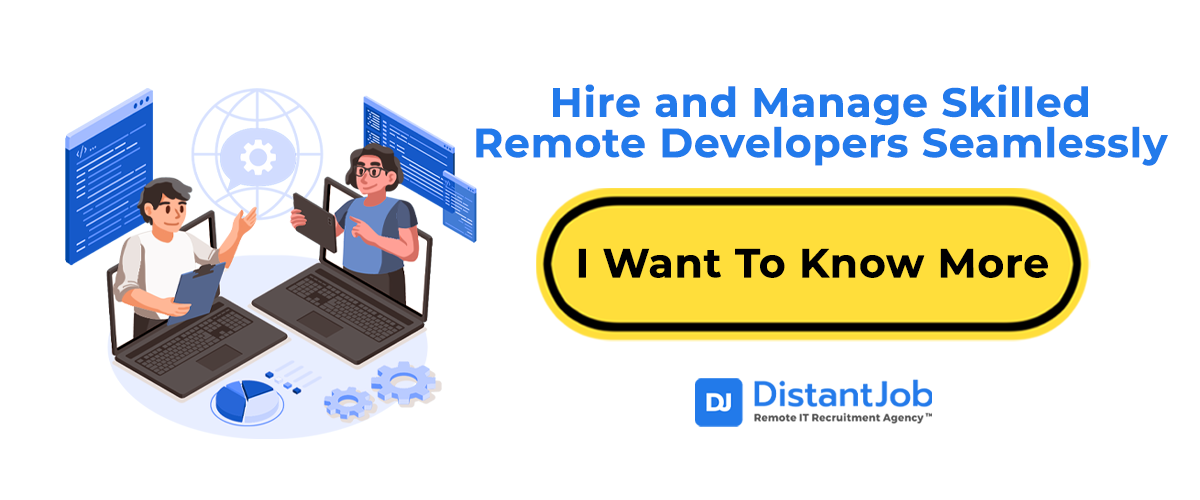As the world leans more into mobile applications, understanding the crucial skills a mobile developer needs becomes pivotal for businesses. The right developer can not only craft engaging apps but also harness the full potential of mobile platforms to drive business growth and user engagement.
So, what specific skills should you look for when hiring a mobile developer for your venture?
From technical skills involving testing, security practices and database management to soft skills, let’s delve into the essential competencies that distinguish exceptional developers from the rest of the pack.
14 Key Skills Every Mobile App Developer Should Have
In order to bring innovative digital solutions to life, mobile developers need to have a skill set that directly impacts the quality and performance of the applications they create.
From designing and building to a seamless UX, these 11 skills are key to keep an eye on when evaluating mobile developers:
1. Programming Proficiency in Mobile Development
Programming forms the backbone of mobile app development.
Mobile developers need to be highly proficient in specific programming languages to build applications tailored to the platform they are targeting. The choice of programming language largely depends on the platform:
- For Android Development (Java and Kotlin): Android developers should be well-versed in both Java and Kotlin. Java has been a traditional choice, while Kotlin offers a more modern and concise alternative. Kotlin is increasingly preferred for its safety features and compatibility with existing Java code.
- For iOS Development (Swift and Objective-C): iOS development involves using Swift and, to a lesser extent, Objective-C. Swift is the more recent and developer-friendly choice, with a strong emphasis on performance and safety. Objective-C is still relevant, particularly when working with legacy iOS code.
Other programming languages and technologies that can be beneficial for mobile developers to have are:
- JavaScript (for hybrid or cross-platform app development)
- HTML and CSS (for hybrid app development)
- C/C++ (for low-level performance optimizations or interaction with hardware components on specific devices.)
- SQL (for managing and querying databases)
- Python (valuable for various scripting tasks, data analysis, and server-side components)
- Ruby (for mobile developers who work on server-side components or backend services.)
- PHP (PHP is ideal for mobile app developers who deal with server-side scripting or backend services
- SwiftUI and Combine (iOS) (for creating user interfaces and handling asynchronous operations.)
- Android Jetpack (Android) (Provides a set of modern tools and libraries to simplify app development.)
- Dart (Flutter)(primary language for building Flutter apps.)
2. Platform-specific Skills
Knowledge of cross-platform frameworks like React Native and Flutter enables developers to write code that works on multiple platforms.
There are two major mobile platforms: Android and iOS. A skilled mobile app developer can code to create apps and services that are able to operate on more than one platform.
According to Statista, with 2.6 million Android apps and 1.85 million iOS applications, both systems are leading the market. Making a distinction between Android and iPhone users makes sense only for specific types of apps and businesses.
When you hire a mobile developer with cross-platform skills, you can build a single codebase app that runs on any platform – saving you money and time.
3. UI/UX Design Principles for Mobile Apps
Proficiency in user interface (UI) and user experience (UX) design principles ensures visually appealing and user-friendly apps.
A well-designed, visually appealing interface creates a positive first impression. It entices users to explore further, while a poorly designed one can lead to immediate frustration and abandonment.
Here’s a breakdown of the main characteristics of UX and UI:
| UX (User Experience) | UI (User Interface) |
| UX is all about making the app as simple as possible. | The primary responsibility is to create a functional interaction between the user and the application. |
| Make the app cohesive and user-friendly for customers to explore (and to return). | Focuses on the aesthetics of the app: Color schemes, design, visual elements, screen size. (They relate emotionally with the user) |
| Main goal: customer satisfaction. | Fast loading (A time-consuming app that makes users leave and never return) |
| Creates solutions for the client’s and user’s needs. | The app is easy to understand and use. |
4. Security Best Practices in Mobile Development
If you want to build a solid application, you need to think of security. Your clients will probably be entering sensitive information on the platform. If you have a bad security system, this information could be exposed and leave your company with a PR nightmare on its hands.
A global consumer survey revealed that frauds were the most concerning cybercrime issues on mobile apps, with 55.7% of respondents worrying about this type of online threat.
Mobile developers should have knowledge of mobile app security, including encryption, authentication, and data protection, to safeguard user information.
5. Integrating APIs and Third-party Libraries
APIs empower developers to extend their app’s capabilities, incorporating features like social media logins, payment processing, mapping services, and real-time weather data. Moreover, APIs offer efficient access to external data sources, streamlining tasks that would otherwise be time-consuming and resource-intensive.
Mobile developers need to have:
- Proficiency in reading and interpreting API documentation
- Knowledge of authentication methods like OAuth and token-based authentication
- The ability to handle and respond to API errors
- Expertise in asynchronous programming for managing non-blocking API calls.
6. Database Management
Database management skills are integral to mobile developers because they enable the efficient storage, retrieval, and management of data crucial for mobile apps.
Whether it’s handling user data securely, optimizing performance, supporting offline functionality, or ensuring compliance with data regulations, proficient database management is at the heart of creating responsive, reliable, and user-friendly mobile applications.
These skills are fundamental for designing data storage systems that can handle scaling needs, protect sensitive information, and synchronize data across devices and servers, all while conserving resources on mobile devices, enhancing the user experience, and facilitating data analytics and reporting when required.
7. Testing and Quality Assurance Expertise
Testing and debugging expertise is pivotal for mobile developers as it underpins the reliability, performance, and overall quality of mobile applications.
Rigorous testing ensures that the app functions as intended, detecting and rectifying issues before they reach users, which is particularly crucial in the highly competitive and unforgiving app market.
Proficient debugging skills enable developers to pinpoint and resolve errors swiftly, enhancing user satisfaction and reducing support requests. Furthermore, mobile devices come in various configurations, so thorough testing on different platforms and screen sizes is essential to guarantee a consistent user experience.
8. Adapting to Different Screen Sizes and Resolutions
Performance optimization directly impacts user satisfaction and the success of mobile applications.
Mobile devices often have limited processing power, memory, and battery life, making it essential to ensure that apps run efficiently and responsively.
Optimizing performance involves minimizing load times, reducing app size, and fine-tuning resource usage to deliver a smooth and snappy user experience.
Slow or resource-hungry apps risk frustrating users and causing high uninstall rates, negatively affecting app retention and reputation. Expertise in performance optimization is, therefore, central to creating mobile applications that not only function well but also thrive in a competitive market by meeting the stringent performance expectations of users.
9. Familiarity with Mobile Development IDEs
Familiarity with Mobile Development Integrated Development Environments (IDEs) is essential for mobile developers as these software platforms are the very foundation upon which mobile applications are built and refined.
Mobile IDEs, such as Android Studio for Android and Xcode for iOS, provide specialized tools, libraries, and an integrated workflow that streamline the app development process.
Proficiency in using these IDEs enhances developer efficiency, simplifies debugging and testing, and ensures that the app adheres to platform-specific guidelines and standards.
10. Version Control Systems
Version control systems such as Git enable developers to track changes, collaborate with team members, and maintain a history of the codebase, thus ensuring code consistency and safety. This is especially vital when multiple developers are working on the same project or when dealing with complex app updates.
Version control systems facilitate the easy identification and resolution of issues, maintain a clean codebase, and allow for branching and merging for concurrent feature development.
They also serve as an essential safeguard against code loss or corruption, enabling easy recovery and rollback.
11. Internet of Things (IoT) Skills
Internet of Things (IoT) skills are becoming increasingly important for mobile developers due to the growing integration of IoT technology with mobile applications.
Proficiency in IoT skills equips mobile developers to connect, control, and collect data from a wide range of IoT devices, from smart appliances to wearable gadgets.
These skills enable developers to harness the power of IoT, providing users with enhanced functionality, automation, and data insights through their mobile apps. IoT skills encompass knowledge of IoT protocols (e.g., MQTT, CoAP), hardware interfaces (e.g., Bluetooth, Wi-Fi, Zigbee), and cloud integration for data processing and storage.
12. Collaboration Skills
Mobile Developers work with teams and different departments. Sometimes they coordinate with the marketing team or present their progress to clients and stakeholders – on your behalf. So, you want a developer who can also speak English, not only coding languages.
Additionally, collaboration skills are essential for the scalability and long-term maintenance of mobile apps. Specifically, version control, exemplified by tools like Git, plays a pivotal role in mobile development.
Git allows for tracking changes in the codebase over time, branching for isolated development, easy merging of changes, and quick rollback in case of issues. Collaboration tools such as project management platforms (e.g., JIRA, Trello), communication tools (e.g., Slack, Microsoft Teams), and code review tools (e.g., GitHub, Bitbucket) are equally important.
13. Staying Updated: Continuous Learning in Mobile Tech
Given the rapidly evolving nature of mobile technology, developers must remain current with the latest tools, frameworks, and best practices to stay competitive in the field. Adapting to new operating systems, programming languages, and design guidelines is essential for creating cutting-edge mobile applications.
Continuous learning enables developers to address emerging security threats, optimize app performance, and deliver a superior user experience. It also fosters innovation by keeping developers informed about industry trends and opportunities, ultimately enhancing their ability to create forward-thinking and high-quality mobile apps.
14. Familiarity with AI tools
With the integration of artificial intelligence and machine learning into mobile applications becoming more prevalent, developers who are well-versed in AI tools can create smarter, more intuitive, and personalized apps.
This proficiency allows them to leverage AI for tasks such as natural language processing, image recognition, recommendation systems, and predictive analytics, enhancing the overall user experience.
Recruiter Insights: How to Spot App Developers with Prime Skills
Did you know that the cost of a bad hire is at least 30% of the employee’s wages in the first year? This without taking into account the time and energy spent during the hiring and onboarding process.
So, how can you ensure you’re hiring the right mobile app developer from the start? By knowing what to look for and keeping an eye out for red flags.
Here are 3 red flags to look out for in a developer’s resume or portfolio:
- Lack of Relevant Experience: Look for developers who have experience in the specific platform (iOS, Android) and programming languages (e.g., Swift, Java, Kotlin) your project requires.
- Overemphasis on Quantity Over Quality: A portfolio filled with numerous projects but lacking in-depth descriptions or real-world results may indicate a focus on quantity over quality.
- No Testimonials or References: The absence of recommendations or references from previous clients or colleagues is a warning sign.
What to look for in their portfolio:
- Relevant Projects: A portfolio should include projects relevant to your app’s scope, complexity, and industry.
- Clear Project Descriptions: Each project should have detailed descriptions of the developer’s role, challenges faced, and how they were overcome.
- Usability and Design: Check for examples of apps with good user interfaces, effective user experience, and attention to design principles.
- Positive User Feedback: If available, look for user reviews and feedback to gauge user satisfaction and app performance.
- Successful Apps: Identify apps that are live on app stores and have a significant number of downloads and positive ratings.
Why Finding the Right Mobile Developer Matters
The right mobile developer can be the difference between an app that merely exists and one that thrives. They have the power to turn ideas into reality, create efficient, bug-free, and user-friendly applications, and play a pivotal role in the overall project’s success.
Mobile developers bring a wealth of knowledge, experience, and creative problem-solving skills to a development project, which can significantly impact its outcome.
At DistantJob, we don’t just offer developers; we curate a digital experience. We carefully handpick professionals who understand not only code but also the pulse of the mobile user.
Our holistic approach to recruitment goes beyond skills and extends to culture fit. We carefully match developers with your team to ensure a seamless integration into your project’s workflow and collaboration dynamics.
Ready to get started? We’re here for you!
FAQ
A mobile developer is a professional who specializes in designing, building, and maintaining applications for mobile devices such as smartphones and tablets. Their main responsibility is to create software that operates on these devices and offers a seamless and engaging user experience.
Their main responsibilities typically include application development, UI and UX, integration of features and functionality, testing and debugging, optimization and security and data performance.
Mobile developers require a diverse set of skills to excel in their roles. These skills make them adept at creating high-quality, user-friendly mobile applications that meet industry standards and the evolving expectations of mobile device users.
Developers gain and improve these skills through courses, education programs, certifications and direct working experience.





